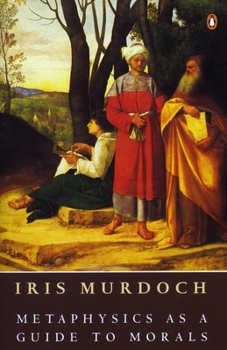Metaphysics as a Guide to Morals
Select Format
Select Condition 
Book Overview
The decline of religion and ever increasing influence of science pose acute ethical issues for us all. Can we reject the literal truth of the Gospels yet still retain a Christian morality? Can we defend "any" 'moral values' against the constant encroachments of technology? Indeed, are we in danger of losing most of the qualities which make us truly human? Here, drawing on a novelist's insight into art, literature and abnormal psychology, Iris Murdoch conducts an ongoing debate with major writers, thinkers and theologiansfrom Augustine to Wittgenstein, Shakespeare to Sartre, Plato to Derridato provide fresh and compelling answers to these crucial questions."
Format:Paperback
Language:English
ISBN:0140172327
ISBN13:9780140172324
Release Date:March 1994
Publisher:Penguin Publishing Group
Length:528 Pages
Weight:0.82 lbs.
Dimensions:1.2" x 5.0" x 7.9"
Age Range:18 years and up
Grade Range:Postsecondary and higher
Customer Reviews
2 ratings
Summary thoughts of a world-class scholar
Published by Thriftbooks.com User , 23 years ago
Iris Murdoch was appointed to the faculty of Oxford at the age of twenty-nine. In this book, published in 1992 and based on a series of public, valedictory lectures she was invited to give, she ranges over philosophy, literature, the concept of consciousness, the relationship between religion and morality, and other topics. She "cuts loose" here, unworried about academic niceties, expressing her unvarnished opinions. She is marvelously fluent in the western philosophical tradition, addressing Plato, Kant, Schopenhauer, Wittgenstein, Sartre, and Derrida, among others. Her position, reflecting many years of development, is Platonic in the best, pagan sense: she argues against modern versions of relativism, but also insists that all perception is saturated with value. She is concerned with the future of spirituality in a "demythologized" culture, and draws on Platonism here as well: "God" as a metaphorical representation of Good, Good as the ultimate (secular) source of spiritual nourishment. The vision is very clear and consistent. A shorter, earlier exercise is The Sovereignty of Good, and the novels Under the Net and The Nice and the Good address themes discussed more directly here.
Interesting but Dated
Published by Thriftbooks.com User , 25 years ago
This book reminds me a good deal of Walter Kaufmann's Critique of Religion and Philosophy. In both cases, an extremely well educated person with a literary or scholarly background tries to buttress traditional European ethical philosophy against what Yeats called the 'rough beast... slouching towards Bethlehem': i.e., positivism, fascism, existentialism, and all the rest of the 20th century -isms. Murdoch makes the same turn inward that Kaufmann does, seeing religion as a valid, real aspect of subjective experience and, following Kant, insisting on the complete separation and concomitant autonomy of the phenomenal and moral worlds. She then makes an essentially Platonic argument for the existence of objective moral standards. Most contemporary readers will find the terminology and the welter of names to be bewildering, to say the least. They may also feel whirled in circles by the book's sustained abstraction and insistence on subjectivity: it's like watching an otherwise sane woman using scissors to cut fog. But to my mind, the main problem is the absence of the most important name of the 19th century: Darwin. Robert Wright's book The Moral Animal explains why Darwin trumps Plato once and for all: "read monkeys for preexistence."






